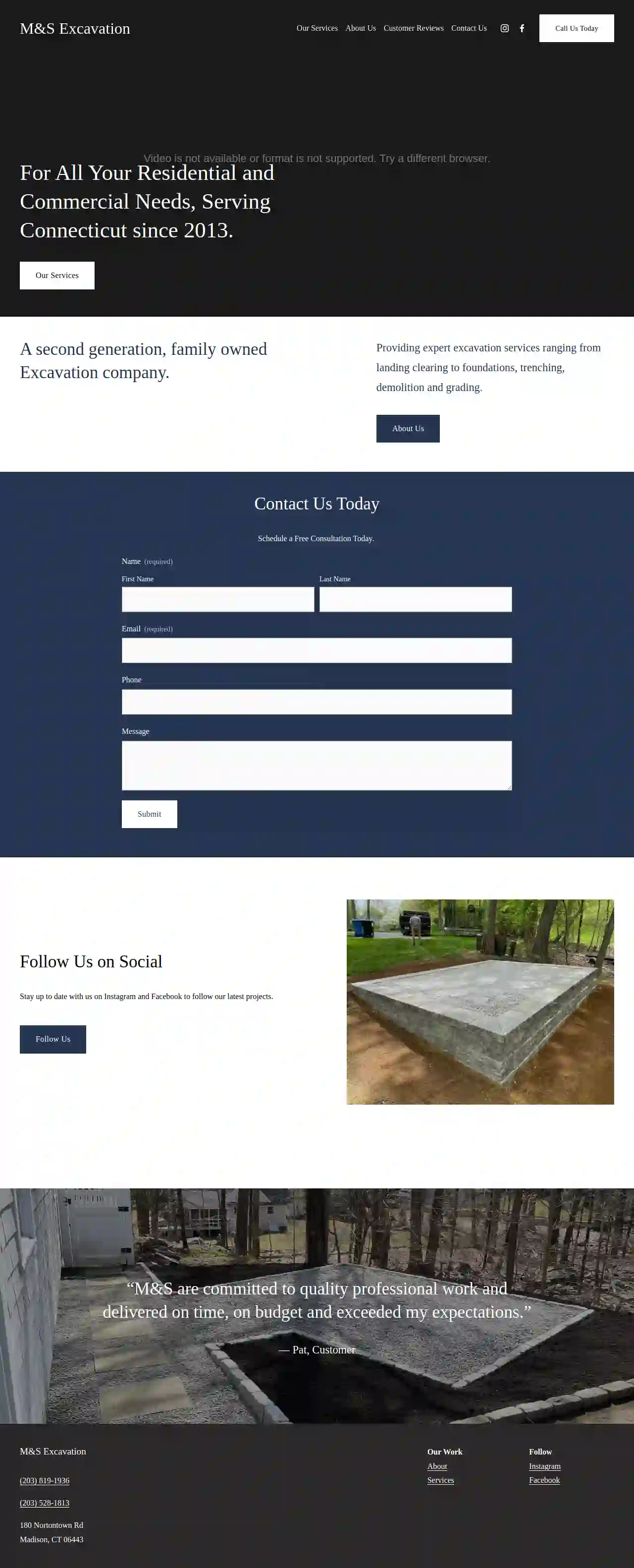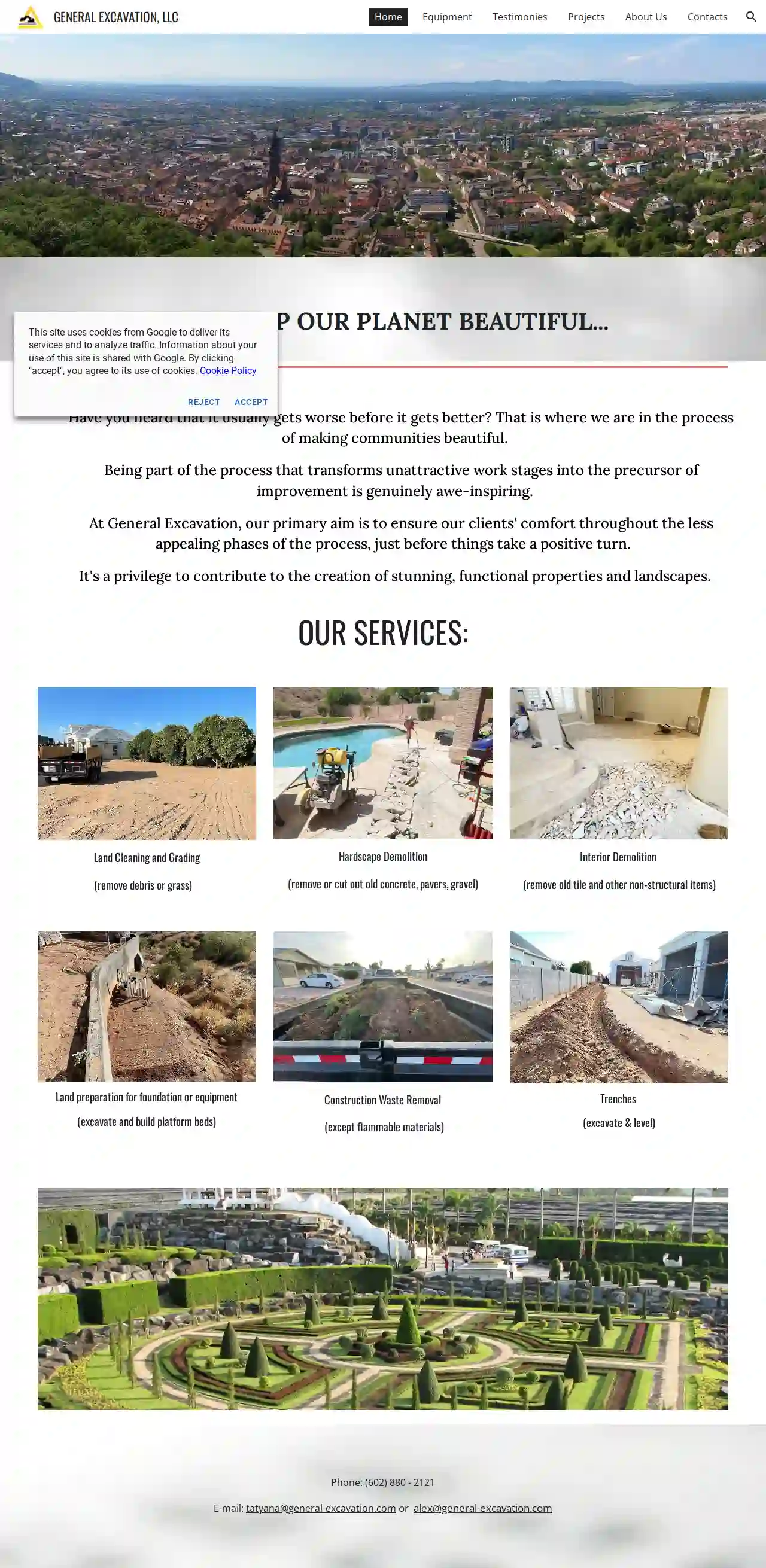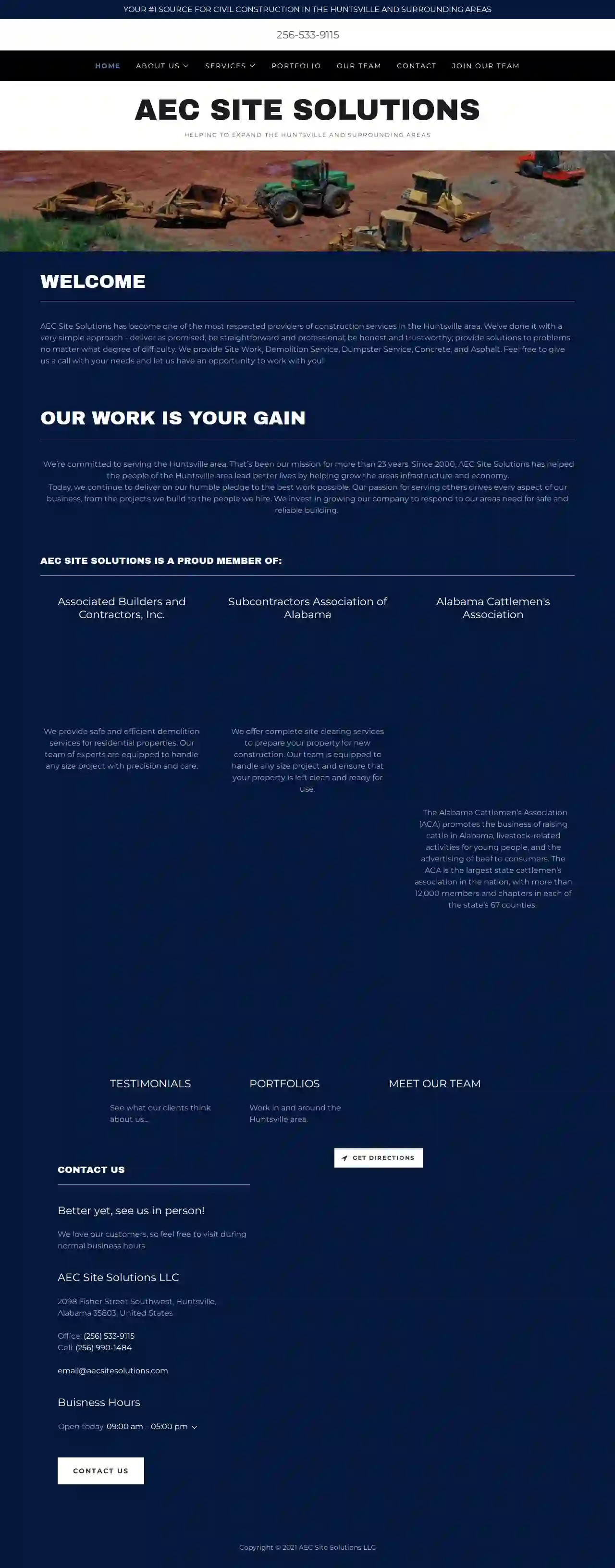Dirt Contractors Birmingham
Find the best Dirt Contractors in Birmingham
Get 3 FREE Dirt Contractor quotes for your project today! Compare profiles, reviews, accreditations, portfolio, etc... and choose the best service.

Borden Construction Contracting and Excavations
51 reviews328 James Frazier Road, Lacey's Spring, 35754, USAbout Borden Contracting Borden Contracting Company LLC has been serving all of North Alabama since 1982, providing services of demolition, clearing, drainage, underground utilities, streets, roads, building pads & parking lots. We are a family-owned and operated business with a commitment to providing our clients with the highest quality services at competitive prices. We are fully licensed and insured, and we have a team of experienced professionals who are dedicated to getting the job done right. We understand that every project is unique, and we work closely with our clients to ensure that their needs are met. We are committed to providing our clients with a positive experience from start to finish. We are proud to be a part of the North Alabama community, and we are committed to providing our clients with the best possible service.
- Services
- Why Us?
- Gallery
Get Quote
North Alabama Land Services
54 reviews11002 Vivian Drive NW, Huntsville, 35810, USNorth Alabama Land Services is here to help you! We are a family-owned and operated business with rock solid values that stand for honesty, integrity, and hard work. We know that your property is important to you, so it is important to us too. Therefore, we are not finished until you are satisfied. We look forward to meeting you, and getting to work on your next project. Please contact us to schedule your in person appointment for a free estimate. Your land, our expertise, endless possibilities. Unleash your land's potential with North Alabama Land Services.
- Services
- Why Us?
- Our Team
- Gallery
Get Quote
Rogers Group, Inc.
3.664 reviews421 Great Circle Road, Nashville, 37228, USBuilding Communities From the Ground Up Rogers Group Inc., headquartered in Nashville, TN, is the largest privately owned construction aggregate company in the country. For more than 115 years, our crushed stone and hot mix asphalt have laid the foundation for homes, schools, hospitals, highways, and other infrastructure critical to the American economy. American-Owned, Family-Led With over 3,000 skilled employees and more than 85 quarries and 55 asphalt plants, Rogers Group supports business operations in 10 states: Alabama, Arkansas, Indiana, Kentucky, Mississippi, North Carolina, Ohio, South Carolina, Tennessee, and Texas. Our Core Values Our company culture is informed and strengthened by our core values of placing the highest value on people, unwavering integrity, and excellence in every undertaking. Our success hinges on the satisfaction of our employees and our customers. History Founded in 1908 in Bloomington, IN, by Ralph Rogers, Rogers Group has become the largest family owned and operated manufacturer of crushed stone in the United States. Safety Safety is our number one priority. Over the years we’ve earned dozens of awards for our unwavering commitment to the safety and well-being of our employees and our community. Community We take an active role in the communities in which we live and work. From charity runs to partnering with schools to sponsoring exhibits at the Smithsonian, we’re making a difference. Environment We’re also deeply committed to being responsible stewards of the environment. We strive to minimize waste, conserve energy, recycle materials, and maintain clean, safe operations. Quality & Awards Our locations are frequently recognized for safety, community relations, and quality. We have received awards from the National Stone, Sand and Gravel Association and other regional trade groups.
- Services
- Why Us?
- Gallery
Get Quote
M & S Excavation & Septic LLC
514 reviews180 Nortontown Rd, Madison, 06443, USSecond Generation Family Owned Experts in Excavation M&S Excavation is a family-owned and operated excavation company serving Connecticut since 2013. We are committed to providing our customers, both residential and commercial, with excellent services at the fairest price possible. We stand behind our work and will not rest until our customer is 100% satisfied with the end result. We offer the highest quality services and expertise, combining generations of craftsmanship and experience on all types of projects. We work closely with customers as well as contractors. We offer a free consultation and estimate for all work and guarantee a price match on any competitive bid.
- Services
- Why Us?
- Testimonials
- Gallery
Get Quote
Roto-Rooter Plumbing and Water Cleanup
4.8Huntsville, USYour Local Roto-Rooter Plumber in Huntsville, AL Roto-Rooter delivers expert plumbing solutions in Huntsville, Alabama, that you can count on 24/7/365. Whether you’re struggling with sewer lines, water damage, or drain cleaning, our skilled plumbers are ready to tackle any plumbing challenge, large or small. Since 1935, Roto-Rooter has stood apart from the pack as Huntsville’s premier provider of drain cleaning and plumbing services. Our commitment to quality and customer satisfaction means that when you choose Roto-Rooter, you get: Same day service 24/7 availability Highly trained, experienced plumbers State-of-the-art diagnostics and equipment No hidden or extra charges for plumbing or drain service on holidays, nights, and weekends Free onsite and upfront estimates Fully licensed, insured, experienced plumbers Senior and military discounts Special financing options available Schedule your appointment with our Huntsville plumbing experts via our online form, or call our 24/7/365 service line at 256-533-7246. Comprehensive Plumbing Solutions in Huntsville, AL No matter what plumbing problem you’re facing, Roto-Rooter has the expertise and experience to get the job done right. We offer a wide range of plumbing services, including:
- Services
- Why Us?
- Testimonials
- Gallery
Get Quote
General Excavation, LLC
55 reviewsMadison, USGeneral Excavation: Transforming Landscapes, One Project at a Time General Excavation is a dedicated team committed to enhancing communities through meticulous landscaping and excavation services. We understand that the process of transforming a space can be challenging, and we strive to make it as smooth and comfortable as possible for our clients. Our passion lies in taking on the less appealing phases of a project, ensuring that the foundation for a stunning and functional outcome is laid with precision and care. We are proud to contribute to the creation of beautiful and practical properties and landscapes, leaving a lasting positive impact on the communities we serve.
- Services
- Why Us?
- Gallery
Get Quote
Pipp & Sons Excavating
59 reviewsPO Box 215, Chelsea, 35043, USAlabama's Premier Excavating Specialists If you’re looking to tackle some excavating, grading or machine work, you’ve come to the right place! We offer a variety of services: clearing, french drains, land grading, roads, fences/gates, and pond work. No matter the size of the project, we take pride in our excellent work, competitive fees and ability to deliver outstanding results on time - every time. From coordinating projects to finishing projects with care, we conveniently guide our clients through all services. Get an Estimate
- Services
- Why Us?
- Testimonials
Get Quote
Thrash Commercial Contractors
1216 Woodgate Dr. S, Brandon, MS, 39042, USThrash Commercial Construction: Building Trust, Relationships, and Success Stories Since 1977, Thrash has been exceeding expectations throughout every stage of the construction process. Our talented team brings a level of attentive communication and detailed execution that controls risk, increases value, and delivers successful projects time and time again. We are a customer-obsessed company that values building strong relationships with our clients. We believe in transparency and open communication, ensuring that our clients are informed and involved every step of the way. Our commitment to quality and safety is unwavering, and we strive to deliver projects that meet or exceed our clients' expectations. We are proud of our track record of success and are committed to continuing to provide our clients with the highest level of service and expertise. We are a commercial general contractor that exists to exceed expectations in the commercial construction experience. Our talented team brings a level of attentive communication and detailed execution that controls risk, increases value, and delivers successful projects time and time again.
- Services
- Why Us?
- Gallery
Get Quote
A E C Site Solutions
57 reviews2098 Fisher Street Southwest, Huntsville, USAEC Site Solutions: Your #1 Source for Civil Construction in Huntsville and Surrounding Areas AEC Site Solutions has earned a reputation as one of the most respected construction service providers in the Huntsville area. Our success stems from a simple yet effective approach: delivering on our promises, maintaining professionalism and transparency, and offering reliable solutions to any challenge. We specialize in Site Work, Demolition Service, Dumpster Service, Concrete, and Asphalt. Don't hesitate to contact us with your construction needs, and allow us the opportunity to collaborate with you. Our Work is Your Gain We are dedicated to serving the Huntsville community. This commitment has been our driving force for over 23 years. Since 2000, AEC Site Solutions has played a vital role in enhancing the lives of Huntsville residents by contributing to the growth of the area's infrastructure and economy. We remain steadfast in our pledge to deliver exceptional work. Our passion for serving others permeates every aspect of our business, from the projects we undertake to the talented individuals we employ. We invest in our company's growth to meet the region's demand for safe and reliable construction services. AEC Site Solutions is a Proud Member of: Associated Builders and Contractors, Inc. Subcontractors Association of Alabama Alabama Cattlemen's Association
- Services
- Why Us?
- Our Team
- Testimonials
- Gallery
Get Quote
Prefabex USA
12501 Alexandria Road, Anniston, 36201, USExpert Modular Construction in the USA A practical, affordable and sustainable solution to housing and development Prefabex USA Discover excellence with the USA's leading modular home constructor. A leading prefab and mobile home builder delivering bespoke solutions. Pre-engineered Steel Buildings Prefabex USA is the industry-leading manufacturer of pre-Engineered steel and metal building solutions. With custom and turnkey buildings.
- Services
- Why Us?
- Gallery
Get Quote
Over 3,943+ Excavation Businesses on our directory
Our excavation contractors operate in Birmingham & beyond!
ExcavationHQ has curated and vetted Top Excavation Contractors in Birmingham. Find a top & reliable contractor today.
Frequently Asked Questions About Dirt Contractors
- For Structural Fill: Use compacted granular fill, such as gravel or crushed stone, for stability and drainage. Avoid using organic materials like topsoil or wood chips, as they decompose and can create voids over time.
- For Landscaping: If you plan to plant in the filled area, use a blend of topsoil and fill dirt. This provides a balance of fertility and structure. Amend the soil with compost or other organic matter to enhance its drainage and nutrient content.
- For Drainage: If the hole is intended for drainage, use a layer of gravel or crushed stone at the bottom to improve water flow. Then, backfill with a porous soil mix that allows water to percolate through.
- Increases Soil Stability: Compacted soil is less likely to shift, settle, or erode, providing a stable foundation for structures, walkways, or driveways.
- Improves Drainage: Compaction can enhance drainage by reducing the soil's porosity and allowing water to flow more efficiently.
- Reduces Settlement: Proper compaction minimizes future settling, preventing uneven surfaces or structural damage.
- Enhances Load-Bearing Capacity: Compacted soil can support heavier loads without excessive compression or deformation.
- Clean Fill: Consists of uncontaminated soil, rock, or gravel, free from organic matter, debris, or hazardous substances. Suitable for most construction and landscaping projects.
- Structural Fill: A compacted granular fill, typically gravel, crushed stone, or a mixture of both, used for structural support and drainage. Ideal for foundations, roadways, and retaining walls.
- Engineered Fill: A specifically designed and blended soil mix with controlled properties, such as compaction, drainage, or bearing capacity, tailored for particular applications.
- Unsuitable Fill: Materials like topsoil, organic matter, or contaminated soil that are not suitable for structural fill due to their potential for decomposition, settlement, or environmental concerns.
- Designated Disposal Facilities: Contact your local waste management authority or search online for designated dirt and debris disposal facilities in your area. They accept various types of soil and construction materials.
- Recycling Centers: Some recycling centers accept clean fill dirt, concrete, or brick for reuse in other construction projects.
- Donation: If the dirt is clean and suitable for gardening or landscaping, consider donating it to community gardens, schools, or neighbors with landscaping projects.
What type of dirt is best for filling a hole?
What is dirt compaction, and why is it important?
What are the different types of fill dirt?
What is the best way to dispose of excess dirt?
What type of dirt is best for filling a hole?
- For Structural Fill: Use compacted granular fill, such as gravel or crushed stone, for stability and drainage. Avoid using organic materials like topsoil or wood chips, as they decompose and can create voids over time.
- For Landscaping: If you plan to plant in the filled area, use a blend of topsoil and fill dirt. This provides a balance of fertility and structure. Amend the soil with compost or other organic matter to enhance its drainage and nutrient content.
- For Drainage: If the hole is intended for drainage, use a layer of gravel or crushed stone at the bottom to improve water flow. Then, backfill with a porous soil mix that allows water to percolate through.
What is dirt compaction, and why is it important?
- Increases Soil Stability: Compacted soil is less likely to shift, settle, or erode, providing a stable foundation for structures, walkways, or driveways.
- Improves Drainage: Compaction can enhance drainage by reducing the soil's porosity and allowing water to flow more efficiently.
- Reduces Settlement: Proper compaction minimizes future settling, preventing uneven surfaces or structural damage.
- Enhances Load-Bearing Capacity: Compacted soil can support heavier loads without excessive compression or deformation.
What are the different types of fill dirt?
- Clean Fill: Consists of uncontaminated soil, rock, or gravel, free from organic matter, debris, or hazardous substances. Suitable for most construction and landscaping projects.
- Structural Fill: A compacted granular fill, typically gravel, crushed stone, or a mixture of both, used for structural support and drainage. Ideal for foundations, roadways, and retaining walls.
- Engineered Fill: A specifically designed and blended soil mix with controlled properties, such as compaction, drainage, or bearing capacity, tailored for particular applications.
- Unsuitable Fill: Materials like topsoil, organic matter, or contaminated soil that are not suitable for structural fill due to their potential for decomposition, settlement, or environmental concerns.
What is the best way to dispose of excess dirt?
- Designated Disposal Facilities: Contact your local waste management authority or search online for designated dirt and debris disposal facilities in your area. They accept various types of soil and construction materials.
- Recycling Centers: Some recycling centers accept clean fill dirt, concrete, or brick for reuse in other construction projects.
- Donation: If the dirt is clean and suitable for gardening or landscaping, consider donating it to community gardens, schools, or neighbors with landscaping projects.